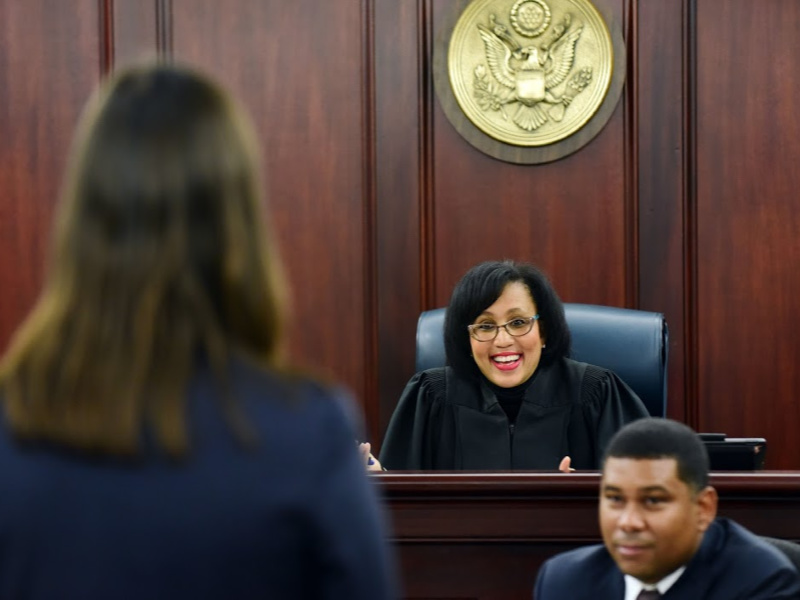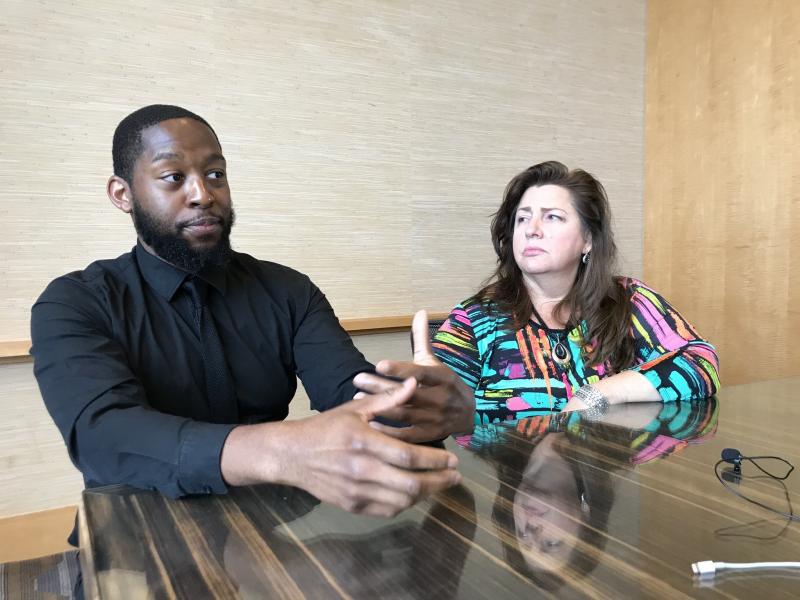Tulane Law honors trailblazers with inaugural Black Law Alumni Awards
A trailblazing judge, an advocate for underrepresented communities and a national leader in equity and inclusion were selected by their peers as the first recipients of the inaugural Tulane Black Law Alumni Awards.
The Awards – three in total – were presented at the Tulane Black Law Alumni Reunion, which was held Feb. 2-5:
- The Wayne Lee Award for Outstanding Service to the Profession was presented to Judge Karen Wells Roby (L’87), Magistrate Judge for the U.S. District Court for the Eastern District of Louisiana;
- The Deans Kramer & Clayton Award for Leadership in Equity, Diversity and Inclusion was given to Michelle Wimes (L’94), Chief Equity and Inclusion Officer at Children’s Mercy in Kansas City;
- The Janice Foster Emerging Leader Award was awarded to Christopher James (L’15), a Racial Justice and Well-Being Associate at the Burns Institute.
“We are excited to celebrate the leadership of three extraordinary alumni who are making a huge impact in their communities and in the broader profession,” said law Dean David Meyer. “These awards are named for pioneering Tulane Law leaders who blazed trails in their own careers. This year’s inaugural winners could not be better representatives of their legacy.”
The law school announced last summer that it was creating three awards named for trailblazing Black alumni and deans to would honor those who exemplified leadership and furthered diversity in the legal profession, including those who are early-career professionals. The new awards were conceived and developed by the alumni leadership committee responsible for planning Tulane’s Black Law Alumni Reunion.
The Wayne Lee Award for Outstanding Service to the Profession
This award recognizes Tulane Law alumni who exemplify servant leadership and timeless contributions to the legal profession and is named after trailblazing New Orleans attorney Wayne Lee (L’74), who is credited with helping to diversify Louisiana’s legal profession. This year’s recipient is Judge Karen Wells Roby (L’87), a U.S. Magistrate Judge for the Eastern District of Louisiana, who has served on the court for 24 years.
As a Magistrate Judge for the Eastern District of Louisiana, Judge Roby has served the court in resolving disputes as a mediator and rendering reasoned legal decisions on complex matters. Formerly, she served as the Chief U.S. Magistrate Judge from 2017-2021.

Judge Roby in 2012 served as the President of the Federal Magistrate Judges Association (“FMJA”), a national organization of more than 600 U.S. Magistrate Judges across the country. As President of the Association, she worked to secure pay raises for all active and recently retired federal magistrate judges. She is a graduate of Tulane Law School and Xavier University. Currently, she is enrolled in the Duke Law Masters of Judicial Studies Program where she is slated to receive a Masters’ Degree in Judicial Studies in May 2023.
She has been active in the American Bar Association serving in various leadership roles and was responsible for the success of the Professional Success Summit "PSS”. PSS is a conference of diverse leaders who trained future leaders in the areas of marketing, branding and networking.
Judge Roby serves as an advisor to the Dean of Tulane Law School as a member of the Dean's Advisory Board and is an Adjunct Professor at Tulane with 11 years of service, most recently teaching a course on E-Discovery and Digital Evidence.
Judge Roby is a frequent speaker and thought leader in E-Discovery. She is the chair of the Tulane Law School’s Black Alumni Reunion, which celebrated 50 years of graduating black law students in February 2019. As chair of the reunion committee, Judge Roby also was the visionary force behind the Tulane’s BLA Newsletter, which was first launched after the reunion and now issues quarterly which works to the achievement of Tulane’s BLA.
Her commitment to the legal and larger community is unsurpassed. She was integral in saving her high school from closing by joining several alums in their effort to purchase the historically black female Catholic high school in New Orleans. She has and continues to serve as the coordinating judge over the Suit Up for the Future Program in New Orleans, a diversity pipeline program for high school students. The program is in its 12th year of operation and has been recognized by the American Bar Association for its contributions to diversity in the profession.
The Deans Kramer & Clayton Award for Leadership in Equity, Diversity
The Deans Kramer and Clayton Award is named in honor of John Kramer and Robert Clayton, whose passionate leadership in the cause of racial equity and justice helped to transform Tulane Law School. Dean Kramer was Tulane Law School’s 19th Dean and served from 1986 to 1996; Kramer recruited Robert Clayton to serve as Assistant Dean of the Law School and the founding director of Tulane Law’s pioneering Minority Access Program.

Created to recognize exemplary impact in advancing the cause of access and inclusion in the legal profession, this year’s award recipient, Michelle Wimes (L’94), is a nationally-recognized expert on professional development, diversity and inclusion in the workplace. Wimes worked for 14 years in three AmLaw 100 firms, practicing all aspects of employment litigation, and serving as an equity partner at a Kansas City-based firm. She focused on matters involving employment discrimination, harassment, and civil rights issues while representing clients before administrative agencies and courts.
She worked to promote diversity and inclusion as an attorney before taking on leadership roles, first as the Director of Strategic Diversity Initiatives at Shook, Hardy & Bacon, LLP where she was charged with leading the firm's diversity efforts across nine national and two international offices and then as the Chief Diversity and Development Officer at Ogletree Deakins, where she was recruited to lead both the firm’s diversity and professional development departments across 45 national and eight international offices.
In 2020, Wimes became the inaugural Chief Equity and Inclusion Officer at Children’s Mercy Hospital where she now leads the DEI efforts of the hospital's 9,000-employee base over 18 locations. In less than two years, she has conducted the hospital system's first Diversity Workforce Assessment, developed their inaugural DEI Strategic Plan, and developed innovative health equity initiatives to address homelessness, food insecurity, and anti-racism in Kansas City. Wimes continues to be an active leader at Tulane and other institutions as a mentor to law and medical students and as a leader in innovative pipeline and pathway programs to open up both the fields of law and medicine to underrepresented students.
The Janice Foster Emerging Leader Award
The Janice Foster Award honors the legacy of Janice Martin Foster (L’70), the first African American woman to graduate from Tulane Law and a trailblazer in the New Orleans bar. It recognizes early-career Tulane Law alumni who have distinguished themselves for their leadership and service to the profession and the larger community.
This year’s recipient of the Janice Foster Award is Christopher James (L’15). James is a Racial Justice and Well-being Associate at the Burns Institute, where he has worked for five years, helping to reduce racial and ethnic disparities in adult and youth justice systems nationwide. Throughout his career, James has focused on grassroots work to sup port communities of color, which all too often do not have a voice within various systems where they are overrepresented.
port communities of color, which all too often do not have a voice within various systems where they are overrepresented.
While attending law school, James worked to serve students recommended for suspension and expulsion throughout the Greater New Orleans area as a member of SUFEO (Stand Up For Each Other), a collective of Tulane and Loyola law students working to end the school-to-prison pipeline. While completing his education at Tulane Law, James interned with the Youth Law Center in San Francisco, Calif., and the Federal Public Defender’s Office in Miami.
Before joining the Burns Institute, James held a position with CASA New Orleans, helping community members advocate for the rights and needs of foster youth throughout the Greater New Orleans area as well as helping to install the CASA program within the St. Bernard Parish court system.
After graduating from law school to become a public defender, James eventually came to realize he wanted to have more of a widespread impact as opposed to doing good for individual clients while communities continued to be overwhelmed by a broken justice system. It was in law school that he came to really see the connection between youth justice systems, school discipline, and the adult criminal justice system With that perspective, he has continued to advocate for the transformation of justice systems into equitable pathways to create healing and thriving communities for all people.
